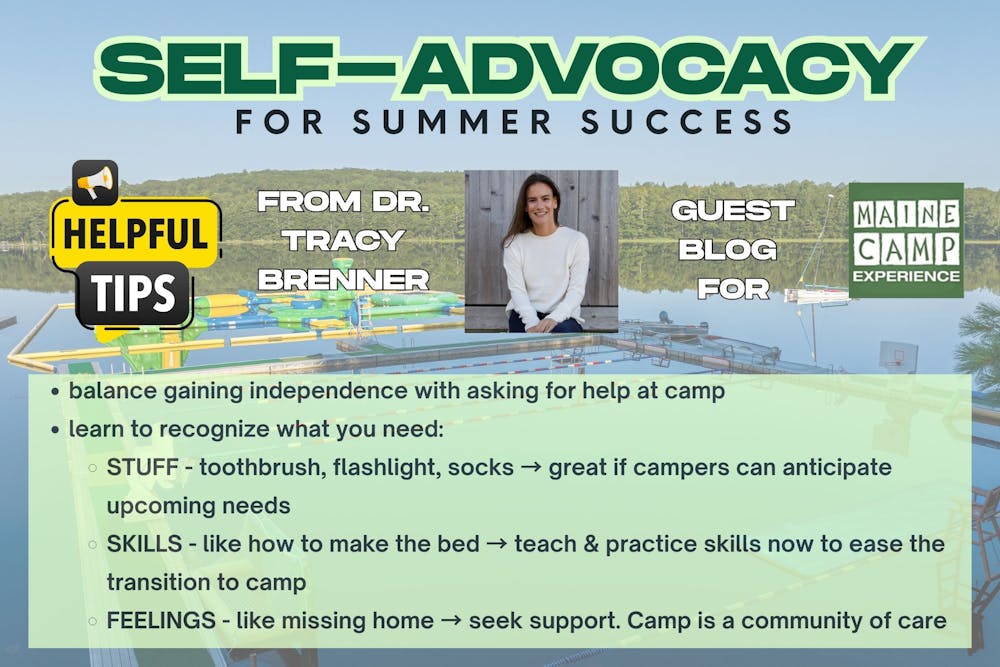
Self-advocacy for Summer Success
April 15, 2025
My friend tells a story of getting her son ready for his first summer of camp and asking him the following question: “What should you do if you lose your toothbrush?” With confidence he replied, “write you a letter and ask for a new one.” And as she imagined the disgusting condition of his teeth as he went without a toothbrush for the five days for the letter to reach home, followed by five more for the toothbrush to reach camp, she took a deep breath and said, “it looks like we need to work on some more effective self-advocacy skills for camp!”
While most kids have no problem asking their parents for what they need, many have a harder time asking others for help. And while gaining independence is one of the developmental benefits of camp, knowing when, how, and whom to ask for help and support is equally important.
As you prepare your child for their summer at sleepaway camp, talk to them about noticing and recognizing what they need. Camper needs fall largely into these three categories: stuff, skills, and feelings. “Stuff” is often the easiest to address because it’s clear and concrete. Examples include: noticing they’ve lost an essential item like a toothbrush, seeing that their flashlight has run out of batteries or realizing that they are way too low on underwear to make it to the next laundry day. While it may seem simple, be explicit with your child that if there are items they need, they should let their counselor know. Furthermore, you can teach your child that this type of advocacy is even more effective when they can anticipate upcoming needs. It’s better to ask for a new tube of toothpaste when you’re almost out, than when you can’t possibly squeeze another drop.
The next category of self-advocacy is asking for help with skills they have not yet mastered independently. While in my last blog I discussed teaching and practicing skills with your child to help ease the transition to camp, no one expects children to never need an extra hand. While your camper should certainly be encouraged to try to do things independently (like putting that pesky fitted sheet on their bed) certain things are just challenging to do on your own. While a counselor is an obvious support in these situations, encourage your camper to also ask a friend or a bunkmate for help. If a peer is up for the job, your child will get the help he or she needs and their friend can feel pride in being a valuable source of support.
When it comes to emotions, some kids are an open book and naturally look to others for comfort and support. Other kids are more reserved and tend to keep feelings close to their chest. Some children don’t seek support because they want to look strong. Some children fear they will be flooded by emotion if they open up. And others feel shame or embarrassment for feeling sad, particularly if they believe no one else is feeling that way. The reality is that all feelings at camp are completely normal, even the hard ones, and most people feel comfort when they are not left alone with their feelings. Prepare your camper by explaining that at camp, just like at home, there will be times when they feel joy, excitement, and happiness, and times when they feel sad, frustrated or angry. Explain to your child that camp is a community of care where everyone from camp big brothers/ big sisters, to counselors, to group leaders, to administrators are there to provide support. If and when your child has big feelings this summer, encourage them let someone know. They are likely to feel so much relief by reaching out.
As you help you to prepare your child for their summer, remind them of the many people at camp who are there to help and support them. Whether it’s restocking sunblock, tying shoes, or being a source of comfort when missing home, tell your child to ask for what they need.
Remember, it’s hard for someone too just know if a helping hand is needed, so teach your child to advocate.